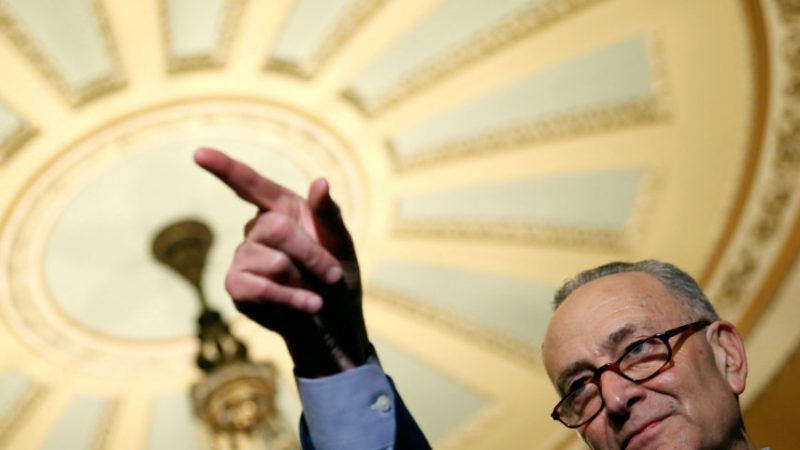Democratic Senators Who Voted Against Iran Deal Blame Collapse of Iran Deal for High Gas Prices
Having two senators who opposed the Iran deal show up to denounce Trump for pulling out of the Iran deal was only the beginning of the hypocrisy exhibition.

Displays of political hypocrisy just don't get any more brazen than the recent press conference by four Senate Democrats criticizing President Trump for soaring gasoline prices.
The Democratic Senate leader, Charles Schumer (D-N.Y.), claimed that the price increases were "directly" related to "President Trump's reckless decision to pull out of the Iran deal." What Schumer didn't mention was that he had voted against the Iran deal. Senator Robert Menendez (D-N.J.) also voted against the Iran nuclear deal, and he, too, was at the Capitol Hill press conference denouncing the high gas prices.
As for the supposed link between the Iran deal and gas prices, not even the nonpartisan fact-checkers at the University of Pennsylvania's Annenberg Public Policy Center bought Schumer's argument. The Annenberg Center's FactCheck.org researched the issue. It found that other factors, such as robust global economic growth and a decision by the Organization of the Petroleum Exporting Countries to curb production, were more influential.
Meanwhile, Democrats ostensibly worried about the effects of renewed Iran sanctions on gas prices still widely resist increased offshore drilling or new pipelines here in the U.S.
Having two senators who opposed the Iran deal show up to denounce Trump for pulling out of the Iran deal was only the beginning of the hypocrisy exhibition.
The other two senators at the event—Edward Markey (D-Mass.) and Maria Cantwell (D-Wash.)—have both introduced actual legislation whose purpose was to raise the price of fossil fuel energy to reduce greenhouse gas emissions and combat climate change.
As the Economist described Cantwell's bill in 2010: "Under her bill, the government would impose a ceiling on carbon emissions each year. Producers and importers of fossil fuels will have to buy permits. The permits would be auctioned, raising vast sums of money…The bill would raise energy prices, of course." Cantwell had a scheme to redistribute some of the "vast sums of money" to American consumers, but that doesn't change the essential feature of higher prices on oil, gas, and fossil fuels.
Markey, meanwhile, was, back when he was in the House of Representatives, the original co-sponsor of the American Clean Energy and Security Act of 2009, also known as the Waxman-Markey energy tax, which Republicans claimed would increase gas prices 58%.
Even today, Democrats on Capitol Hill are sponsoring legislation aimed precisely at raising gas taxes. Nearly 30 House Democrats have signed onto what is, with remarkable candor, called the "Raise It Act," which would increase the federal gasoline tax to 33.3 cents a gallon from the current 18.4 cents, and then link it to inflation. Democratic Senators Sheldon Whitehouse and Brian Schatz have introduced the American Opportunity Carbon Fee Act of 2018, which would impose a tax—they call it a "fee"—on petroleum products, including gasoline.
The rapid reversal by the Democrats from pursuing higher gas prices to blaming President Trump for them was a bit much for even some members of the Washington press corps. One of them asked Schumer if there might be some benefits to higher gas prices. Say, encouraging people to consider carpooling, public transportation, or buying electric cars rather than gas-guzzling sport utility vehicles? Schumer replied that he was for raising the mileage standards.
Those corporate average fuel economy standards are perfect example of a top-down, command-and-control approach, rather than a Hayekian approach in which change is driven by price-sensitive decisions by individual consumers. If gas costs $5 a gallon, individuals might respond by deciding to buy the Tesla or the Chevy Bolt or Prius Prime plug-in hybrid instead of the used Buick Roadmaster station wagon. Or they might make like Schumer himself and ride a bicycle.
The final bit of hypocrisy in the press conference came when Senator Markey attributed the gas price increase to American exports. "We are sending our oil overseas to benefit foreign nations like China," Markey complained. "Why do we send our oil overseas instead of keeping it here?"
If the Democrats ever want to offer an intellectually coherent alternative to Trumpian tariffs, they might ponder the logical implications of Markey's question. Would it really make everything cheaper in America if America didn't export anything but just kept everything here? Imagine if this approach were applied to, say, software, or computers, or pharmaceuticals, financial services, fast-food restaurants, beer, or ice cream, or motorcycles, movies and music. How might other nations respond to such a strategy? Imagine, by Markey's reasoning, how much cheaper iPhones could be if Apple kept them all here in the U.S. instead of selling them in other countries.
The Democratic complaints about Trump and gas prices, like many other complaints about Trump, are more about Trump than they are about gas prices. They are a political hit unencumbered by any discernible consistent logical or economic framework. That may not be much consolation when you fill up the car for a summer road trip. But it is the reality.
Ira Stoll is editor of FutureOfCapitalism.com and author of JFK, Conservative.


Show Comments (11)